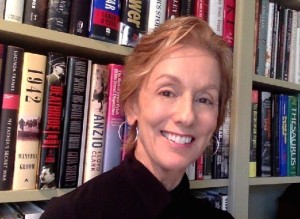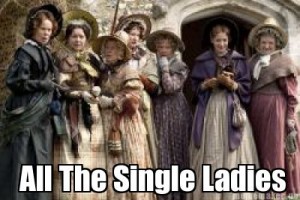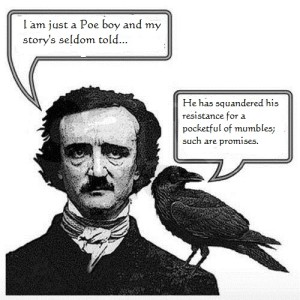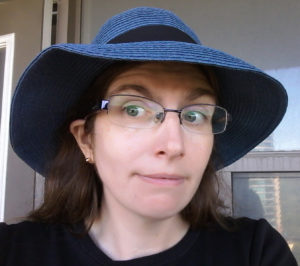 Kari Maaren is is a writer, cartoonist, musician, and university English instructor who lives in Toronto, Canada. She has just published her first novel, Weave a Circle Round, an old-fashioned kids’ fantasy adventure. If you challenge her to a duel, she will choose a ukulele as her weapon, or possibly an accordion if she really has it out for you.
Kari Maaren is is a writer, cartoonist, musician, and university English instructor who lives in Toronto, Canada. She has just published her first novel, Weave a Circle Round, an old-fashioned kids’ fantasy adventure. If you challenge her to a duel, she will choose a ukulele as her weapon, or possibly an accordion if she really has it out for you.
Her website is here and she is on Twitter as @angrykem.
Is there a literary heroine on whom you imprinted as a child? A first love, a person you wanted to become as an adult, a heroic girl or woman you pretended to be on the playground at recess? Who was she?
I want to say Meg Murry, but I know she’s been covered pretty thoroughly by other people. I’m still going to sneak Meg into my answers because I just can’t help it. However, for my main answer, I’ll go for Elizabeth from Robert Munsch’s The Paper Bag Princess. I was obsessed with Elizabeth when I was little. I can still quote sections of the book.
Can you remember what it was these characters did or what qualities they had that captured your affections and your imagination so strongly?
Elizabeth is the complete opposite of me. She’s girly enough to moon openly over a boy, but as soon as her One True Love is kidnapped by a dragon, she just hops into that paper bag and sets out to rescue him. I stopped being brave enough to tell boys I liked them after one of my friends made it clear to me, when we were both about nine, that I wasn’t pretty enough to do that. If a dragon burned down everything I owned and kidnapped my (secret) One True Love, I would probably go to pieces. Elizabeth was a girl who could get things done. As well, my middle name is Elizabeth, so when I was younger, I sort of saw Munsch’s Elizabeth as my secret identity. Maybe Kari would never have been able to do those things, but Elizabeth could. I also identified strongly with the end of the story, when Ronald rejected Elizabeth because she was dirty and dressed in a paper bag, and she called him a bum and waltzed off into the sunset alone. A lot of the other stories I heard at that age told me the girl was supposed to marry the boy and live happily ever after. Elizabeth could live happily ever after without marrying the boy. I wanted to be her so badly.
Sneaky Meg note: Meg is much more flawed than Elizabeth, which is why I love her. I don’t think I’ll ever forget that Meg saves the day not with her strengths but with her faults.
Sneaky Alyx Response: I loved that about her too!
How does she compare to the female characters in your work? Is she their literary ancestor? Do they rebel against all she stands for? What might your creations owe her?
Weave a Circle Round’s protagonist, Freddy, starts off as more of a Meg than an Elizabeth. She’s singularly immature at the beginning of the novel, and while her faults aren’t the same as Meg’s, they’re just as pronounced. She’s very unlike Elizabeth in that she has to grow into her own competence. Elizabeth has an arc, but because the book is so short, her development happens very quickly. She goes from a princessy princess in love with Ronald to a paper-bag-wearing badass capable of tricking a dragon in the blink of an eye. Freddy starts as a social coward in denial about just about everything, and when she finds herself in a bad situation, she doesn’t snap immediately into Bravery Mode; she has to work at it. I still love Elizabeth, but she’s a wish-fulfilment fantasy. That isn’t a criticism—we need our wish-fulfilment fantasies—but I find that my characters tend to muddle through their adventures instead of facing them head on.
Sneaky Meg note: Meg’s faults will, I suspect, reverberate through everything I’ll ever write. Freddy doesn’t use her faults to save the universe, but they’re also firmly part of her, not superficial elements that are cast aside when she grows up a bit. As I tell my students a lot, there’s a difference between a “strong character” and a “strong person.” Strong characters can be weak people. In fact, many of the best stories are about weak people struggling against their own weaknesses.
How do you feel about the word heroine? When I started talking to people about writing these posts, I am specifically looking for female authors’ female influences, whether those women they looked up to were other writers or Anne of Green Gables. Does the word heroine have a purpose that isn’t served by equally well by hero?
I like the word “heroine.” Yes, it’s rooted in the word “hero” and can be seen as redundant, but the problem is that when we collapse the terms, we still treat the male hero as the norm and the female hero as a deviation from the norm. The term “male hero” seems redundant; the term “female hero” doesn’t. Therefore, when we speak of “female heroes,” we often mean women who fit the male heroic standard, not women who fit some gender-neutral heroic standard. The word “heroine” acknowledges that women can be heroic—in the literary or the broader sense—without necessarily conforming to a model regarded as inherently male.
I study and teach fairy tales. My course has a unit on heroes and a unit on heroines. The students tend to go into the course assuming that the heroes will be handsome princes and the heroines passive princesses awaiting rescue. What they learn is that while there are certainly plenty of passive princesses, they tend to have been made that way by writers such as Charles Perrault and the Brothers Grimm. There are many “Cinderella”-like stories in which Cinderella doesn’t just sit around and moan because she can’t go to the ball. Fairy-tale girls go out into the world to seek their fortunes just as often as fairy-tale boys, and both boys’ stories and girls’ stories frequently culminate in marriage (not love but the economic transaction of marriage, via which both boys and girls can rise in the world). At the same time, the handsome princes the students are expecting tend to appear only as simple reward figures in female-centred stories, while the “heroes” unit is full of tricksters. “Hero” and “heroine” are both words with rich histories, and they’re more complex than a lot of people know. Getting rid of “heroine” because everyone assumes it’s a lesser, demeaning category does a disservice to the spinning women who used to sit around weaving tales about clever girls using magical women’s implements—spindles, carding combs, spinning wheels, needles, even laundry—to complete their quests. The sword is not the only weapon out there.
About this post: The Heroine Question is my name for a series of short interviews with (usually) female writers about their favorite characters and literary influences. Clicking the link will allow you to browse all the other interviews, with awesome people like Faith Mudge, Stephanie Burgis, and S.B. Divya . If you prefer something more in the way of an actual index, it’s here.





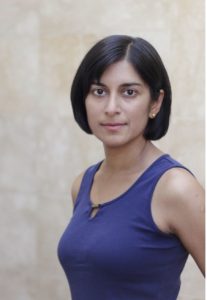 S.B. Divya
S.B. Divya
